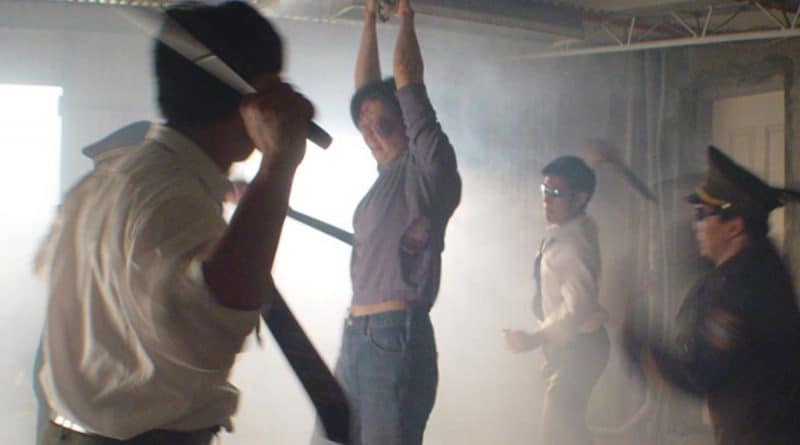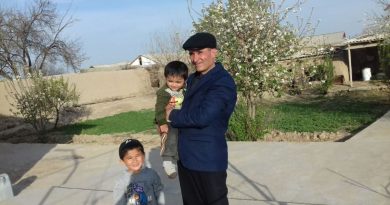Kyrgyzstan: torture victim seeks compensation in court
The Coalition Against Torture told ACCA that on February 11, the first trial took place concerning the case of Ulan Nazaraliev regarding the recovery of compensation based on the decision of the UN Human Rights Committee.
“As it was expected, the Ministry of Finance and the Ministry of Internal Affairs have taken a tough stance and don’t intend to pay compensation. Their representatives claim that the victim inflicted beatings on himself. The officials of the Ministry of Internal Affairs deny that police beat Nazaraliev. At the same time, the Prosecutor General’s Office admits the beating and even reports that “strict measures were taken against the police in this case”. The message doesn’t specify the names and surnames of the employees. Also, it doesn’t indicate what is meant by strict measures,” said the human rights activists.
The Coalition Against Torture explained that the next meeting on this case would take place on February 24. Human rights activists expect that the Ministry of Internal Affairs will present to the trial information about the punished policemen and information about what kind of punishment they were given. Moreover, a representative of the government apparatus is expected to be present in the courtroom.
It’s worth recalling that in November last year, it became known that the UN Human Rights Committee recognized Ulan Nazaraliev as a victim of torture and cruel treatment during his detention in the temporary detention center of the police department of Jalal-Abad in 2012.
38-year-old Ulan Nazaraliev was beaten with fists, kicked, strangled. When he complained of a headache, the police gave him a razor blade with the words that “he may even cut himself, and no one will help him”.
Out of despair, the man inflicted cuts on himself in the area of the hands. After that, the doctors were nevertheless called. Ulan was taken to the regional hospital of Jalal-Abad for medical stitches and bandaging of wounds.
The next day, the law enforcement officers began to beat Nazaraliev’s head against the wall in their office. Unable to withstand the physical pain, he removed the stitches from the wound on his arm. The wound began to bleed; Ulan fell to the floor. The officers of the temporary detention center kicked him and then handcuffed his right wrist to a heating radiator. In this position, the man was left indefinitely.
Ulan Nazaraliev was admitted to the neurological department of the regional hospital and held in a special guarded ward for administrative and investigative persons. On admission, he was diagnosed with closed craniocerebral trauma and hypertension. The man complained of headaches, nausea, vomiting and emotional instability. Due to bruises in the kidney area, he experienced severe pain and couldn’t urinate.
According to the conclusion of the forensic medical examination, the person under investigation [Nazaraliev] suffered minor harm to his health, resulting in a short-term health disorder or a slight permanent disability for a period of 7 to 21 days. The experts concluded that “Nazaraliev may have harmed himself with a sharp and blunt object.”
The police also exerted psychological pressure on the torture victim. When he was transported from one institution to another, police officers removed Nazaraliev’s underwear and photographed his genitals.
The conclusion of the forensic psychiatrist says that “the impact of stress factors in the form of cruel treatment and torture was accompanied by the infliction of physical and psychological suffering on Nazaraliev.”
Ulan Nazaraliev has repeatedly demanded a meeting with the prosecutor. He was forced to go on a hunger strike and didn’t eat for four days before he could evoke a response from the competent authorities.
One of the investigators of the Prosecutor’s Office of Jalal-Abad city was assigned to check Nazaraliev’s complaint about torture. However, the prosecutor issued an order to refuse to initiate a criminal case, stating that “the arguments indicated in the complaint were not confirmed” and “there is no corpus delicti in the actions of the police officers of Jalal-Abad city”.
The representatives of the human rights organization “Spravedlivost” [“Justice”] stood up for the torture victim. They went to court. In the first two instances, the complaint about the use of torture against Nazaraliev was upheld. However, the Supreme Court ruled in favor of the Prosecutor’s Office of Jalal-Abad and decided to refuse to open a criminal case.
Having exhausted all legal remedies at the national level, Ulan Nazaraliev appealed to the UN Human Rights Committee. The Committee took the side of the torture victim and decided to collect compensation from the state in his favor.




